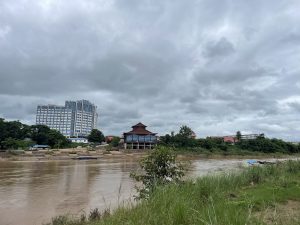Thailand today suspended electricity, internet services, and fuel supplies to three regions of neighboring Myanmar in an effort to combat the online scamming centers that have been established there.
Speaking to the press yesterday, Deputy Prime Minister and Defense Minister Phumtham Wechayachai said that the alarming spike in scamming operations in neighboring parts of Myanmar had become a threat to Thailand’s national security.
Over the past five years, hundreds of thousands of people have been tricked into running scams for Chinese organized crime syndicates across Southeast Asia, according to the United Nations. The operations have been concentrated in loosely regulated parts of Cambodia, Laos, and Myanmar, many of them bordering Thailand.
The decision to cut off power to the scam sanctuaries was made at a National Security Council meeting earlier yesterday that was attended by Phumtham and other senior officials, who concluded that the security threat “justified decisive action against the online scamming operations,” as the Bangkok Post reported.
“We must take action to cut off the electricity immediately,” Phumtham told reporters, according to Reuters.
According to the Bangkok Post, the measures will target three areas where the crime groups are known to operate: Myawaddy, across from Mae Sot in Tak province; Payathonzu, opposite Three Pagodas Pass in Kanchanaburi; and Tachileik, opposite Mae Sai district in Chiang Rai.
Phumtham said that the authorities had instructed the Provincial Electricity Authority to cut supplies to Myanmar-based power distributors at five connection points serving these three areas, starting at 9 a.m. today.
Scamming operations have become an issue of public debate in Thailand since the Chinese actor Wang Xing, 22, went missing on January 3 near Thailand’s border with Myanmar. Wang was rescued on January 7 from a scam center in Shwe Kokko, a notorious scam hub in Myawaddy.
The case generated considerable negative publicity in China, prompting fears that the criminal activity could damage Thailand’s economically pivotal tourism sector. The Thai government has since gone to considerable lengths to assure prospective Chinese visitors that Thailand is a safe and welcoming destination.
“What happened has had a huge impact on many Thai people and the image of the country,” Prime Minister Paetongtarn Shinawatra said prior to yesterday’s National Security Council meeting.
Paetongtarn will today depart on a four-day state visit to China, during which online fraud and tourism will be among the main topics of discussion with Xi Jinping and other Chinese leaders.
China’s government, also facing public concern due to the Wang Xing abduction, has in recent weeks pressed mainland Southeast Asian governments including Thailand to redouble their efforts to shut down scam operations. Late last month, China and Thailand also agreed to establish a coordination center in Bangkok to “investigate and combat call center gangs based in Myawaddy, Myanmar, and along the Cambodian border.”
Liu Zhongyi, China’s assistant minister of public security, also visited Thailand last week, during which he visited the Mae Sot-Myawaddy border region and reportedly requested that the government cut off power and phone services to the Shwe Kokko and KK Park scam compounds in Myawaddy. During meetings, Liu told his Thai counterparts that there are 36 major Chinese scamming gangs “employing” more than 100,000 people.
Given the extent to which the scamming operations have metastasized over the past four years, the Thai measures are long overdue. Even so, it is unclear what effect the cut-offs will have. Over the past few years, scamming gangs have shown a remarkable ability to adapt, shifting their operations to new locales in response to regional crackdowns.
In mid-2023, the Provincial Electricity Authority was reported to have cut off power supplies to Myawaddy and another area in Myanmar’s Kayin (Karen) State, again at China’s urging. As the Bangkok Post reported this week, this failed, and “facilities there remain operational, possibly based on oil-fueled electricity generation. In some cases, users found other sources of electricity after the cutoff.”
There is every chance that the scammers along the Thailand-Myanmar border will find alternative sources of electricity and other vital resources – and they can certainly afford to pay for them, given the immensely lucrative nature of their “business.”
Nonetheless, it is important for the Thai government to communicate to its population, and to China, an important economic partner, that it is doing everything within its power to eliminate the scam gangs – even if a full accounting with these syndicates is some way off.
































